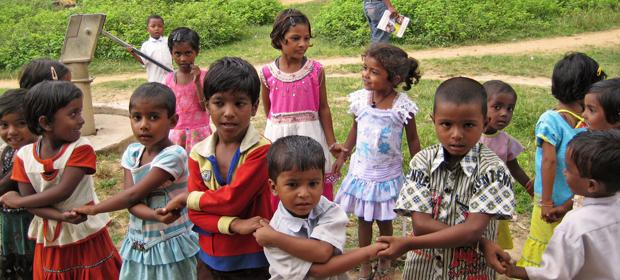Where We Work
See our interactive map


Although India has made tremendous advances in science, medicine, information technology, and many other fields, and has experienced unprecedented economic growth over the past decade, malnutrition remains unacceptably high.[1] Half of India’s population does not get enough protein, calories, and/or micronutrients in their diet, and malnutrition causes at least half of all deaths of Indian children younger than five.[2] Malnutrition during pregnancy and at a very early age can have long-lasting, irreversible effects, yet nutritional programs in India are not adequately reaching infants, very young children, and pregnant women.
The southern Indian state of Karnataka reports some worrying nutritional indicators: more than 42% of children younger than three years old have stunted growth because of poor nutrition, which is 4% higher than the national average. In response, in March 2010 the Karnataka state government launched the Comprehensive Nutrition Mission to eliminate malnutrition. This initiative focuses on three of the most vulnerable groups: children six years old and younger, especially those under age three; girls between the ages of 10-18; and pregnant and lactating women.
The Comprehensive Nutrition Mission’s approach is driven by a set of consensus recommendations captured in the Leadership Agenda for Action, developed by the Coalition for Sustainable Nutrition Security in India. This agenda focuses on proven, essential nutrition and primary health care interventions such as:
The Coalition for Sustainable Nutrition Security in India comprises a diverse group of national leaders including Professor MS Swaminathan, an international expert in agricultural sciences, food security, and nutrition security. The Coalition for Sustainable Nutrition Security also advocates putting the Leadership Agenda’s recommendations into action through groups that offer strategic direction and technical inputs to government programs.
USAID/India supports the Coalition, and the IntraHealth-led Vistaar Project serves as the Coalition’s Secretariat. The Vistaar Project also supported the Karnataka Nutrition Mission in designing its organizational strategy.
For further details on the Coalition for Sustainable Nutrition Security in India, please visit http://www.nutritioncoalition.in
[1] Sustainable Nutrition Security in India: A Leadership Agenda for Action, New Delhi, India. May 2010
[2] Government of Karnataka’s Comprehensive Nutrition Mission- Concept Paper



